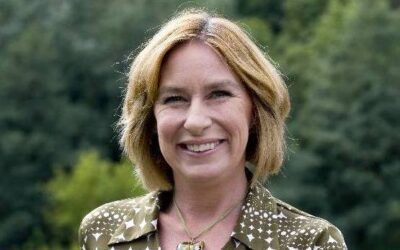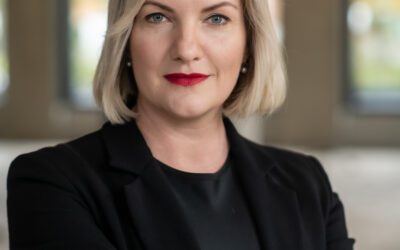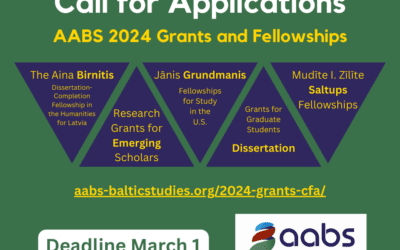AABS is pleased to recognize Laima Vincė for the completion of her dissertation “Memory and Postmemory in the Writing of North American Writers of Lithuanian Descent,” for which she received the AABS Dissertation Grant in the 2021-2022 cycle.
Dr. Vincė is a featured speakers of the “Baltic Literature at a Crossroads” plenary during the 28th Biennial AABS Conference on Baltic Studies.
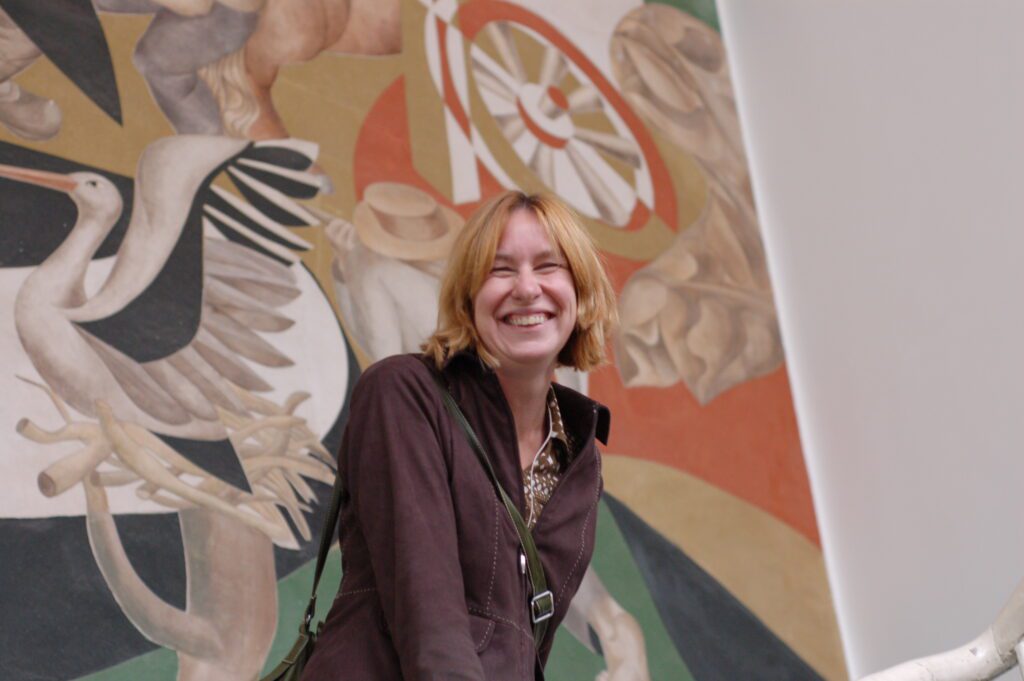
©Vladas Brazunas, 2022
Dr. Laima Vincė has been publishing fiction and nonfiction in the United States, United Kingdom, and Lithuania over the past thirty years. She writes in both English and Lithuanian. She is a well-known literary translator from Lithuanian into English, known for her poetry translations of Lithuania’s most prestigious poets. Most recently, Vincė published Karantino dienoraštis (The Quarantine Diary) with the Lithuanian publisher Dominicus Lituanus (2021) and a collection of love letters between two resistance fighters, Apie Anuos Nepamirštamus Laikus (About Those Unforgettable Times) with the Lithuanian Institute of Literature and Folklore (2021). Vincė is a recipient of a National Endowment for the Arts award in Literature, a PEN Translation Award, and many other honors. She graduated with an MFA in Writing from Columbia University in New York and an MFA in Nonfiction from the University of New Hampshire. Laima Vincė lives and works in Vilnius, Lithuania and in New York and Maine.
The Impact of an Award: Report from Laima Vincė
After the completion of her dissertation, Laima Vincė submitted a reflection to AABS.
We thank her for her permission to publish her thoughts, which have been lightly edited.
Four days after Russia invaded Ukraine, in the ancient halls of Vilnius University, I defended my dissertation, Memory and Postmemory in the Writing of North American Writers of Lithuanian Descent. We were all still in shell shock over the brutal invasion of Ukraine, but Lithuania was already preparing to shelter and aid Ukrainian refugees. At the same time, Omicron was raging. Even the head of defense committee became ill with Covid-19 and had to conduct the defense proceedings from her sickbed over Zoom. Still, after my hour-long presentation, and after each of the five members of the defense committee presented their analysis and I answered their questions, the committee voted unanimously to grant me a PhD in Humanities from Vilnius University.
I would not have made it to my defense without the generous support I received from the Association of the Advancement of Baltic Studies. The organization’s support was not only financial (and badly needed and much appreciated during the year of pandemic lockdown that defined the final years of my doctoral research) but also intellectual, collegiate, and scholarly. Knowing that the work I was doing and that the interviews I was conducting with North American writers of Lithuanian descent was considered valuable by other Baltic scholars kept me going even when I faced resistance and adversity from Vilnius University due to the interdisciplinary and innovative aspects of my work.
The AABS dissertation grant enabled me to travel from Lithuania to the United States in the spring and summer of 2021 to interview Lithuanian-American and Lithuanian-Canadian writers for my dissertation and for the academic monograph that I am writing based on the research and conclusions of my dissertation. The AABS dissertation grant bought me the time I needed to keep researching and writing after my Vilnius University stipend expired in September 2020, precisely at a time when the economy in Lithuania, where I was living, was dire due to the pandemic.
The AABS dissertation grant enabled me to interview North American writers of Lithuanian descent in Chicago, Anchorage, and New York. Others I interviewed on Skype; although face to face interviews allowed for a deeper level of interaction. The interviews are fascinating and significant in and of themselves, but were especially important to my research because this primary research confirmed my secondary research and literary analysis, and vice versa. Essentially, most of the writers I spoke to, who belong to the second and third generation born to Lithuanian World War II refugees, and those who had been child refugees from Lithuania, described feeling a strong tie to Lithuania, despite the number of decades that had passed since their families had been uprooted. They expressed that the collective cultural and historical trauma experienced by their parents and grandparents, and the collective cultural memory formed by the Lithuanian community shaped by the postwar generation, influenced who they were as people, as writers, and led them to the themes they chose to explore through their writing. At the same time, however, they admitted that they were deeply influenced by American, Canadian, and world literature – in fact, more so than Lithuanian literature or Lithuanian émigré literature.
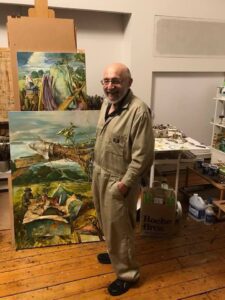
Samuel Bak in his studio in Weston, Massachusetts
©Laima Vincė, July 2021
What struck me during my dissertation defense was how one of the professors on the doctoral defense committee, who had initially been skeptical of the concept of postmemory and how my work applied postmemory to the collective memory and historical trauma of Lithuanian World War II displaced persons and their descendants, admitted that she now realized how my findings were relevant in light of Russia’s war against Ukraine. Lithuanian postmemory expresses itself in the second and third generation through their act of writing novels, memoirs, collections of poetry, and literary nonfiction on the collective historical trauma experienced by Lithuanians during World War II – Soviet occupation, Nazi occupation, deportations to Siberia and Tajikistan, the postwar armed resistance. Although it’s clear that Russia’s invasion of Ukraine is motivated by acquiring natural gas reserves in Eastern Ukraine and other resources, the narrative that Putin constructed to justify the invasion to the Russian nation is based on a postmemory interpretation of the Russian nation’s historical experience of World War II and the alleged non-existence of the Ukrainian nation. Russia’s World War II narrative of Russian Soviets bravely fighting Nazis (the Nazis for their purposes include Ukrainians and Balts) is a powerful aspect of this current war’s postmemory narrative, which has a deep emotional effect on Russian people. Vladimir Putin’s own memory narrative based on the cultural trauma experience of his parents during World War II shapes his propaganda narrative that today Russia is fighting Nazis in Ukraine. Meanwhile, Ukraine is drawing on the wellsprings of cultural and collective memory to unite as a people and fight back. These hero and Nazi narratives may seem inscrutable to those outside of the culture and region, but read in terms of postmemory, they are understandable, if not justifiable. Before Russia invaded Ukraine, I saw my research as an exploration of how history is documented and interpreted through literature. However, after Russia’s war against Ukraine began I saw how postmemory plays a deep role in a nation’s narrative and leads to real-life outcomes. By choosing democracy and independence from Russia, Ukraine is challenging the Russian postmemory narrative, which has its roots in World War II and earlier. I learned through my research, wide reading, analysis, and conducting interviews that postmemory is deeply emotional and personal. When a postmemory narrative is challenged, the reaction may be irrational, and that is because postmemory is linked to familial memory and expressions of collective culture.
Although the bibliography I compiled of literature written by North American writers of Lithuanian descent identified over a hundred works of literature published in the United States and Canada that are based on postmemory themes and narratives, my disseration focuses on five memoirs. These texts serve as memory narratives because the memoirists narrate their own life stories and individual and familial trauma experiences. Additionally, they research and write about the impact of Lithuanian historical trauma (the Holocaust) and Lithuanian cultural trauma (deportations to Siberia, World War II, the postwar experience, the refugee experience, immigration) and how that trauma inheritance has impacted them and their families. Through the process of writing their stories intertwined with their experiences of collective memory narratives, they reflect upon the impact of those historical events on their ancestors, themselves, and their descendants. Their work reflects on individual, familial, intergenerational, historical, and cultural trauma. They also reflect on cultural memory in the North American Lithuanian diaspora community. They employ techniques of postmemory to recreate historical and cultural trauma events that they know initially from family stories and then from subsequent archival research and interviews. All five memoirists – Samuel Bak, Antanas Sileika, Daiva Markelis, Rita Gabis, Julija Šukys – embark on rite of return journeys to Lithuania after independence that lead to catharsis and post-traumatic growth on an individual and creative level. Additionally, these memoirs emphasize the importance of understanding the links between the cultural and historical traumas of Christian Lithuanians and Lithuanian Jews, thus rebuilding bridges destroyed through the historical trauma of the Holocaust in Lithuania.
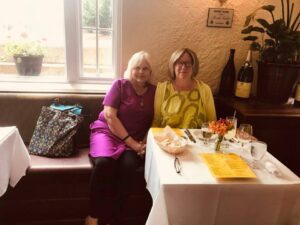
Interview with Lithuanian-American writer Daiva Markelis in Chicago
©Laima Vincė, July 2021
Although significant research has been conducted on the generation of Lithuanian diasporic writers who wrote literary works in Lithuanian published in North America, few researchers or literary critics have studied literature written by North American writers of Litvak and Lithuanian descent who write in English. No researcher has written about this body of work collectively nor considered it through the lens of postmemory or trauma theory. Until I wrote this dissertation, the literary output of North American writers of Lithuanian descent had not been studied together as a cultural expression within the context of North American literature or Lithuanian literature. The five memoirs analyzed in my dissertation have not been regarded together critically as a group.
Most of the writers of these memoirs came of age in North America during the postwar or Cold War periods when travel to Soviet-occupied Lithuania was controlled by the Soviet totalitarian regime, making travel impossible or difficult, depending on a range of criteria established by the Soviet Union’s internal politics. Therefore, for most of these writers, their experience of Lithuania was formed predominantly through participation in the social, cultural, and educational activities of the Lithuanian émigré diaspora communities, and by reading literature written by Lithuanian diaspora writers, rather than by direct experience through travel to Lithuania or interactions with people who had remained in the Soviet Socialist Republic of Lithuania (1944 – 1991).
These writers explore topics of familial and affiliative memory that are geographically, historically, and culturally distant for writers living on the North American continent, yet vitally important to them. There is a belatedness to these memory narratives, which in part is caused by the divisions of the Iron Curtain and Cold War politics, and in part because of the amount of time needed to process and heal from extreme trauma (the first generation) or come to terms with inherited postmemory traumas (the second and third generations).
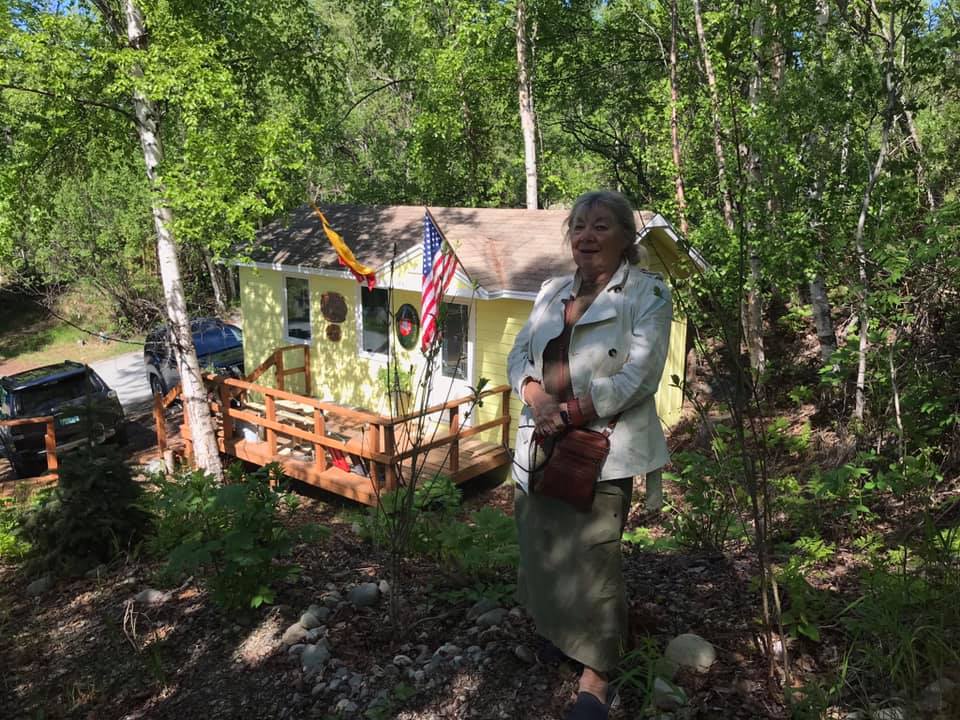
Svaja Worthington, academic, life writer and founder of the Little Lithuanian Museum in Chugiak, Alaska
©Laima Vincė, June 2021
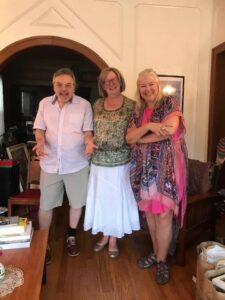
Interview with Lithuanian-American playwright Kestutis Nakas and actress and playwright Audre Budrys
©Laima Vincė, July 2021
The preoccupation in the memoirs with identity, cultural trauma, historical trauma, cultural memory, and postmemory are not an anomaly, and not the isolated topical concerns of five individual writers, but reflect the focus of works of literature that belong to a growing body of literary work written in English and published in North America that concerns itself with Lithuanian postmemory, memory, cultural trauma, and historical trauma topics.
Writers of the second and third postmemory generations dare to take on sensitive emotionally difficult topics that were taboo in the Lithuanian diaspora community, such as moral accountability for those Lithuanians who collaborated with the German occupiers (1941–1944) during the Holocaust in Lithuania and who later found safe harbor in the United States and Canada, where they lived out the remainder of their lives peacefully. This is especially true of the thematic focus and preoccupation of the two memoirs by Gabis and Šukys.
Writing in English about Lithuania, these writers translate their postmemory experience for an audience of North American readers. Through their literary work they strive to create a context to Lithuanian historical trauma and cultural trauma for an audience of North American readers. This audience of readers take on the roles of witness and listener for the writers.
Literary styles range from writing rich with survival humor, irony, and the absurd (Bak, Sileika, Markelis) to reflective, soul-searching, sensitive prose (Gabis, Šukys). With the exception of Bak, who was born in present-day Lithuania, these writers were born on the North American continent, and completed their educations, started their careers, and raised their families in Canada or the United States. Therefore, the influences of North American culture on their narratives are strong. Their literary work is predominantly influenced by North American stylistics and North American (and Jewish) humor. These writers are influenced more by the literary canon and traditions of the English-speaking world.
These memoirs invite readers to reflect upon individual and familial trauma within the greater context of historical and cultural trauma. There are powerful life lessons to be gleaned from reflecting on the experiences of these five writers. Their memoirs may help members of the second and third postmemory generations of the Lithuanian diaspora understand the trauma experienced by the first generation and, hopefully, integrate that trauma. An analysis of these memoirs may help contemporary Lithuanians better understand the cultural trauma and postmemory experience of North American Lithuanian writers of Lithuanian descent.
Furthermore, a lack of understanding, and empathy toward the trauma memory of the North American Lithuanian diaspora left unexplored can lead to a further split between the descendants of people who were once one nation during the interwar period of Lithuanian independence. Postmemory literature that addresses collective cultural trauma opens necessary dialogue that may lead to healing. Another important goal is linking and understanding the historical and cultural trauma of two groups – Christian Lithuanian and Lithuanian Jewish – to work towards healing and posttraumatic growth.
One of the outcomes of my dissertation is that realization that when the expression of cultural and historic trauma is not studied, the damaging effects of a pact of silence within society, and within families, may continue to erode society. Recognizing trauma is the first step towards healing trauma. By identifying trauma in these literary texts, this dissertation opens a greater dialogue on the nature of trauma and how cultural and historical trauma impacts individuals and the collective society both in Lithuania and in the Lithuanian diasporic communities abroad.
What is the Dissertation Grant?
AABS Dissertation Grants for Graduate Students are grants of up to $4,000 to support doctoral dissertation research and write-up in any field of Baltic Studies. Funds may be used for travel to research site, equipment, duplication or other needs as specified. Proposals are evaluated according to the scholarly potential of the applicant, and the quality and scholarly importance of the proposed work, especially to the development of Baltic Studies.
The application deadline for academic year 2023-2024 is February 1, 2023. Applications will be evaluated by the AABS 2023–2024 Grants Committee consisting of AABS VP for Professional Development Dr. Kaarel Piirimäe, AABS President Dr. Dovilė Budrytė, and AABS Director-at-Large Dr. Daunis Auers. Award notifications will be made in April 2023.
Other Grants and Fellowships News
Vanished Lands: Book Publication Subvention Report by Laima Vincė Sruoginis
The Association for the Advancement of Baltic Studies (AABS) is pleased to recognized the successful conclusion of a Book Publication Subvention Grant awarded to Peter Lang Publishers for publishing the book Vanished Lands: Memory and Postmemory in North American...
Elīna Vikmane Birnitis Fellowship Report on Advancing Cybermuseology
AABS is pleased to recognize Elīna Vikmane for the completion of her dissertation "Advancing Cybermuseology: Diffusion of digital innovation in Latvia’s museum sector," for which she received the 2022–2023 Aina Birnitis Dissertation-Completion Fellowship in the...
AABS 2024 Grant and Fellowship Applications Open
Call for Applications AABS 2024-2025 Grants and Fellowships Research Grants for Emerging Scholars The Aina Birnitis Dissertation-Completion Fellowship in the Humanities for Latvia Mudīte I. Zīlīte Saltups Fellowships Jānis Grundmanis Fellowships for...

